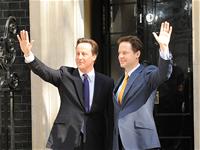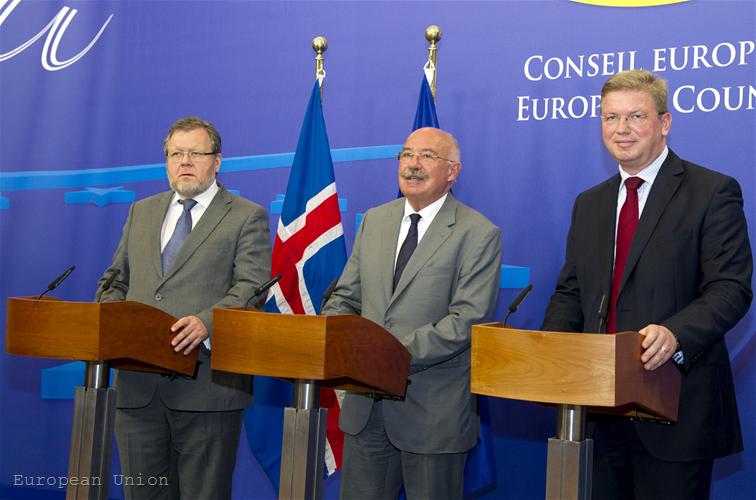The first participation of David Cameron in the European Council
Adelina Marini, June 17, 2010
 The European Council this June will be hot - in every possible aspect. Almost the whole of Europe is hit by a heat wave - literally and as a figure of speech - and on top of this is the World Football Championship in South Africa. And while eurozone economies are trying to find their best approach not just to exit their national fiscal crises but also the save their single currency (the euro), the EU leaders will try and strike a new balance between national and common European. Because this is where the main problem lies. And if the crisis is the main reason for the search of this new balance, it is the crisis that is causing the heat at the European council in Brussels.
The European Council this June will be hot - in every possible aspect. Almost the whole of Europe is hit by a heat wave - literally and as a figure of speech - and on top of this is the World Football Championship in South Africa. And while eurozone economies are trying to find their best approach not just to exit their national fiscal crises but also the save their single currency (the euro), the EU leaders will try and strike a new balance between national and common European. Because this is where the main problem lies. And if the crisis is the main reason for the search of this new balance, it is the crisis that is causing the heat at the European council in Brussels.
But maybe the situation is not that bad as it seems. There is still a possibility for some fresh air at the summit and the foundations of a future solution to be laid - a solution that could go beyond the current moment. And though this might seem a little over optimistic, at least for this year's June Council, there are some visible indications that come from ... Britain.
In a speech before the House of Commons several days ago, the new British foreign minister William Hague set a new tone not just in Britain's attitude towards the European Union but in the Conservatives party's vision, which has recently won parliamentary elections and is now governing in a coalition (for the first time in more than 40 years) with the Liberal Democrats, headed by David Cameron.
This speech, if read attentively, shows two things. On the one hand hand it is a confirmation of the Conservatives' position to keep Britain as far away as possible from any further European integration, and - on the other - it is an admission of the Island's dependence on Europe. And this dependence, according to Mr Hague, is obviously the key which will determine Downing Street's decisions in the following years.
But let us start firstly with the confirmation of positions. Britain will not allow giving away any more sovereignty to Brussels. Britain will not join the single currency. Britain will not accept anyone to view its budget before its national parliament. The latter is a key statement, especially against the background of London's severe fiscal problems.
In the meantime however, William Hague says that the government in London is listening to those Member States who are discussing institutional reforms to the eurozone. But, nothing more. Britain is against the proposal a European institution to review British budgets before the national parliament. Besides, the new coalition government in London is against any new sanctions in the Stability and Growth Pact enforced on countries violating the rules for budgetary deficit and public debt, to be extended for all EU Member States, even those outside the euro area.
And absolutely in the spirit of the United Kingdom, the issue of Financial Perspectives for the next 7-year period (the common EU budget) also found a place in Hague's speech. He says that if the new 10-year EU strategy Europe 2020 is not cohered with the budget or vice versa, it would be another useless document. "The current crisis in the Eurozone demonstrates that it is vital that the EU has a coherent strategy for growth and jobs. But that strategy must fully respect the balance of competence between Member State and Community action. We will be working with partners on the Commission’s proposals for a Europe 2020 strategy to promote growth", William Hague says.
And more: "The 2020 Strategy also faces two immediate problems that need resolution. The first is that the next financial perspective – the seven year EU budgetary framework – needs to cohere with it. In our view its priorities should be aligned with the Strategy. It is deeply unfortunate that the budget review has been so long delayed that linking the two has been made more difficult than it should have been –The second problem is that the 2020 Strategy is a long-term strategy. Recent events require a more immediate response".
Although it sounds typically British, the statement of the foreign minister shows a recognition of realities and that is - that economic integration has gone way beyond national priorities. A proof of that is the admission that 49% of Britain's trade is with the euro area. This is why, according to Hague, it is important the Single Market to be expanded, to have better regulation in order to lighten the burden of business and to use the situation to create a freer trade between the EU and third countries.
And though Britain still sounds like a country watching from the sidelines with participation, based on its national interests, Hague's speech demonstrates a very good understanding of EU's problems, the problems in the eurozone and in the country - fiscal problems, the common economic concerns, long-term perspectives.
What the speech does not say is how against the backdrop of such problems the  government of David Cameron will act in order to manage to preserve the famous British opt-outedness and be able to contribute to the common European welfare. This is why the first pariticpation of David Cameron in the European Council will be so interesting.
government of David Cameron will act in order to manage to preserve the famous British opt-outedness and be able to contribute to the common European welfare. This is why the first pariticpation of David Cameron in the European Council will be so interesting.
 | © European Union
| © European Union | © Larus Karl Ingason
| © Larus Karl Ingason | © euinside
| © euinside